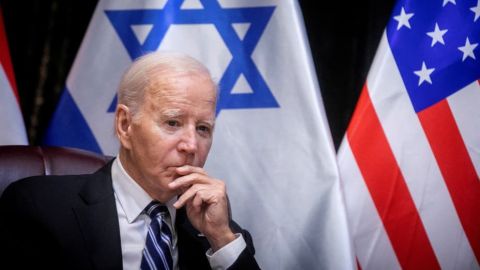US won't support Counter Action Against Iran: Biden
President Biden's recent conversation with Israeli Prime Minister Benjamin Netanyahu has sparked significant attention, with revelations that the U.S. administration will not endorse any retaliatory measures by Israel against Iran. This stance, articulated by a senior White House official, underscores the grave concerns within the Biden administration regarding the potential escalation of hostilities in the region.
The backdrop to this diplomatic exchange is Iran's recent aggression towards Israel, characterized by a barrage of attack drones and missiles launched in retaliation for a targeted airstrike in Syria. The scale of the Iranian assault, with over 200 projectiles fired, prompted swift defensive action from Israeli defense forces, resulting in the interception of the majority of threats before breaching Israeli airspace.
President Biden, in a reassuring tone, commended Israel's successful defense efforts during the call, emphasizing the collaborative defensive measures undertaken by Israel, the U.S., and regional allies. However, the key takeaway emerged when Biden explicitly conveyed the U.S. stance against participating in or endorsing offensive operations against Iran, a position Netanyahu reportedly acknowledged.
This diplomatic exchange reflects a concerted effort by the Biden administration to de-escalate tensions and coordinate a unified response among G7 leaders in the face of Iran's aggression. Biden's forthcoming call with G7 leaders underscores the urgency of diplomatic coordination, with a focus on safeguarding regional stability while reaffirming the commitment to protecting U.S. interests and allies.
As the situation unfolds, vigilance remains paramount, with Biden affirming the readiness to take necessary action to safeguard against potential threats. The intricacies of U.S. engagement in the region, coupled with the delicate balance of power dynamics, underscore the gravity of the situation and the imperative for strategic diplomacy in navigating this volatile geopolitical landscape.
